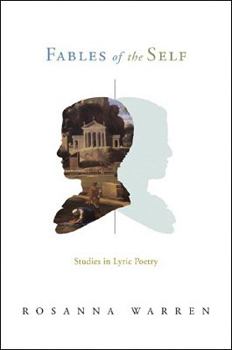Fables of the Self: Studies in Lyric Poetry
Fables of the Self traces ideas of imagined selfhood through the lyric poetry of classical Greece and Rome, the modernist poetry of France, and modern and contemporary English and American lyrics. Rosanna Warren's work emerges from the tradition of British and American poet-critics such as William Empson, Donald Davie, and Randall Jarrell. Her readings of Sappho, Virgil, Baudelaire, Melville, Rimbaud, Mark Strand, and Louise Gl ck, among others, combine Helen Vendler's passionate attention to detail and something of Harold Bloom's panoramic view. Warren opposes both the literalizing, autobiographical approach to self in so-called confessional poetry and the other extreme of avant-garde erasures of self. Framing her critical studies between a memoir of childhood and a concluding journal entry, Warren has composed an occult autobiography, showing the imagination as a transfiguring and potentially moral force.
Format:Hardcover
Language:English
ISBN:0393066134
ISBN13:9780393066135
Release Date:September 2008
Publisher:W. W. Norton & Company
Length:352 Pages
Weight:1.25 lbs.
Dimensions:1.2" x 5.9" x 8.6"
Customer Reviews
1 rating
Telling the truth
Published by Thriftbooks.com User , 16 years ago
Warren's collection of essays is carefully (in every sense) written, wise, and exciting. She begins with a story about how, as a 12-year old child plunked down in a very strict French lycee, she felt rescued by French and Latin poetry. ("I found languages I thought "my own.") Later, she returns to English, that "hospitable, hodgepodge tongue" and includes readings of Hardy and Melville with essays on Virgil, Nerval, and Dante. Her insights could rescue students of literature who are tired of over-politicized critical theory. Warren, herself a poet, loves poetry and her voice is clear as a bell. "When we try to tell truth," she writes, "whoever we are. . . the best we can do, often, is sputter. ... Poetry heals nothing. But ... it can draw us into imaginative relation with truths beyond our own ..."





